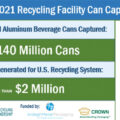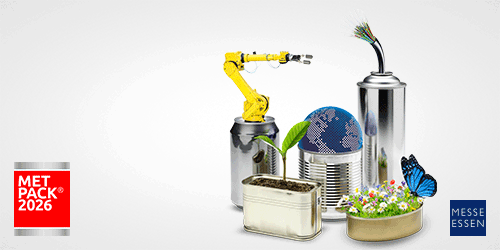The Can Manufacturers Institute and its aluminum beverage can industry members are pursuing lower carbon aluminum production and increased recycling of aluminum beverage cans.
The Can Manufacturers Institute (CMI) and its members, including aluminum beverage can manufacturers and can sheet producers, have endorsed the Mission Possible Partnership’s (MPP) strategy to transition the aluminum industry to zero net greenhouse gas emissions by 2050 and limit global warming to 1.5°C. This approval reflects the industry’s commitment to reduce the carbon footprint of primary aluminum in beverage cans and contribute to the fight against climate change. The MPP strategy includes the deployment of new technologies, decarbonization of energy supply and increased efficiency of materials and products. Supporting this strategy and acting on it will lead to further reductions in the carbon footprint of aluminum beverage cans. CMI aluminum beverage can industry members recognize the importance of limiting global warming to 1.5°C and agree that actions to support the transition must be taken quickly.
Increasing the recycled content of aluminum beverage cans is another way to reduce their carbon footprint. Currently, aluminum beverage cans manufactured in the United States have an average of 73% recycled content, the highest of all beverage containers. The industry aims to increase this percentage by meeting the ambitious aluminum beverage can recycling targets set by the WCC and its members. These goals, set by CMI and its members, involve moving from a 45% recycling rate in 2020, making it the most recycled beverage container in the United States. Targets include reaching a rate of 70% by 2030, 80% by 2040 and 90% by 2050. CMI’s “Aluminum Beverage Can Recycling Primer and Roadmap” describes how these objectives can be achieved. By increasing the recycled content in new cans, the need for primary aluminum is reduced, resulting in a smaller carbon footprint. Scott Breen, CMI’s vice president of sustainability, stresses the importance of reducing the carbon footprint of primary aluminum incorporated into beverage cans and increasing the recovery of used beverage cans. By supporting the Mission Possible Partnership strategy and committing to ambitious recycling rate targets, CMI members are showing leadership in both areas.
Following the Global Aluminum Can Sustainability Summit in September 2022, which brought together more than 100 leaders from across the aluminum beverage can value chain, the WCC and its members endorsed the Mission Possible Partnership (MPP) aluminum sector transition strategy for a net zero and 1.5°C aligned industry. The Summit, jointly organized by the WCC and the International Aluminum Institute, focused on the decarbonization of aluminum and unveiled for the first time the aluminum sector’s transition strategy. Implementing the strategy will require considerable time and investment, as the MPP estimates that about $1 trillion of cumulative investment across the primary production value chain will be needed to achieve a net-zero emissions sector or a 1.5°C trajectory. CMI and its members, including aluminum beverage can manufacturers and sheet producers, will work with stakeholders inside and outside the industry to drive the actions and investments needed to carry out this transition strategy, along with its partner and fellow supporter The Aluminum Association.















